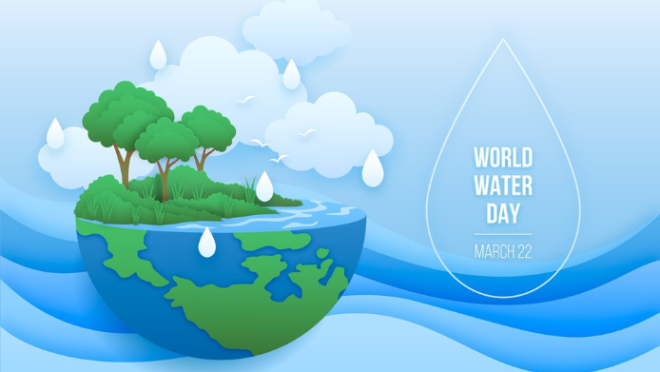Every drop counts: Celebrating World Water Day
Every drop counts: Celebrating World Water Day

Even though our world is covered with 70% water, only 3% of it is freshwater, and within that 3%, only 0.5% is readily accessible in the form of rivers or groundwater. Along with this problem, freshwater is not evenly distributed to all of the world’s population; some areas get abundant supply while others suffer heavily from the lack of freshwater. Recognising the importance of regulating and protecting the world’s limited supply of fresh water, the United Nations celebrates 22nd March as World Water Day.
This year’s theme is glacier preservation. Glaciers are the frozen sources of water mainly located in the North Pole and in the Arctic regions. Due to global warming, the rate of glaciers melting down into the sea has increased rapidly. A new study shows that glaciers worldwide, excluding the polar ice sheets, have diminished by about 5% since 2000. While regional losses differ greatly, with Central Europe suffering the most, the most alarming trend is the accelerated rate of melting observed between 2012 and 2023 compared to the previous eleven years.
Losing this much water, especially when a significant number of people do not have access to fresh drinkable water, is a major cause for concern. Because the groundwater level, due to overirrigation and urbanisation, has been lowering every year. As of 2022, 2.2 billion people lacked access to safely managed drinking water. This means their drinking water is not available when needed, free from contamination, and accessible on premises.
Clean water and sanitation is the number 6 goal in the United Nations Sustainable Development Goals. Because it is not only a matter of drinkable, hygienic water, but also it correlates to floods and droughts, which are increasing with the changing climate patterns. Between 2002 and 2021, floods and droughts devastated communities worldwide. Floods alone resulted in nearly 100,000 deaths and affected 1.6 billion people, while droughts impacted 1.4 billion and caused over 21,000 fatalities. These disasters, exacerbated by climate change, are expected to worsen, bringing more extreme weather events.
In order to make people aware, the UNGA adopted a resolution declaring 2025 as the International Year of Glaciers’ Preservation, along with proclaiming 21 March of each year as World Day for Glaciers starting in 2025. These initiatives aim to increase global awareness about the vital role of glaciers, snow, and ice in the climate system and water cycle and to highlight the economic, social, and environmental impacts of the changes in the Earth’s cryosphere. They also promote sharing best practices and knowledge on addressing the accelerated melting of glaciers and its consequences.
You can read the resolution in the following link: https://documents.un.org/doc/undoc/gen/n22/755/97/pdf/n2275597.pdf We can still safeguard glaciers, essential for freshwater and climate stability, by decreasing greenhouse gas emissions and implementing significant adaptation and mitigation measures.
Lowering global emissions
It’s crucial to drastically reduce greenhouse gas emissions to keep global warming within 1.5°C of pre-industrial levels, as outlined in the Paris Agreement. This action is essential to slow glacier melting and mitigate associated risks such as sea-level rise, water scarcity, and floods. Global calls emphasise reducing emissions and shifting to renewable energy.
Improving water management
Effective management of glacial runoff is vital to prevent both water shortages and floods. Many regions require enhanced water infrastructure to store seasonal meltwater, and countries should improve water efficiency and reuse practices.
Adaptation planning for vulnerable communities
It’s essential to develop thorough adaptation plans for communities that depend on glaciers for their water supply. This includes creating more robust agricultural practices, diversifying local economies, and strengthening disaster response systems in regions at risk from glacier-related floods and sea-level rise.
Ecosystem restoration
Protecting and restoring the ecosystems surrounding glaciers helps to regulate water flow, preserve biodiversity, and assist local communities in adapting to shifts in water patterns.
International cooperation
For nations sharing transboundary water resources from glaciers, exchanging knowledge, data, and water conservation strategies is vital for managing the regional impact of glacier melt.
To sum up, glaciers are crucial to regulate the world’s climate and stop the devastating rippling effect on the freshwater supply, and without awareness and adequate actions by both non-government and government agencies, the future is truly not aspirational. Therefore, this day should remind the world community about the necessity to take reliable and impactful actions in the long run.


